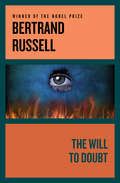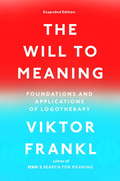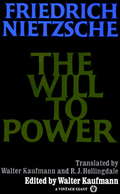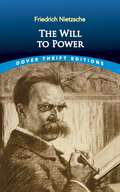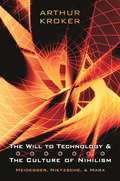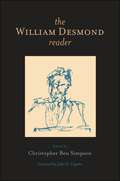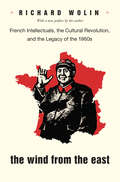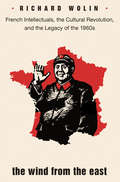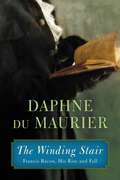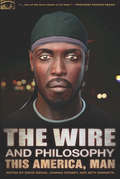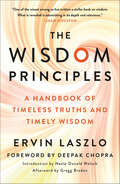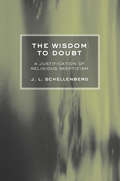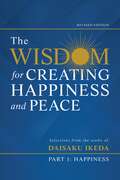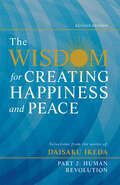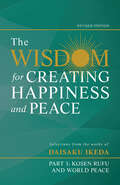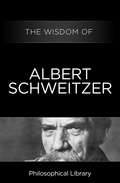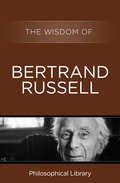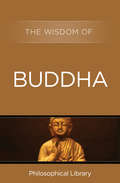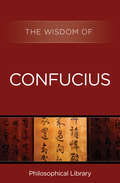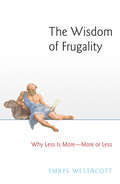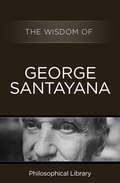- Table View
- List View
The Will to Doubt
by Bertrand RussellOne of modern history&’s great thinkers takes on prejudice, superstition, and conventional wisdom, using wit and insight to argue for a rational way of life. In a brilliant series of essays, Bertrand Russell uses challenging skepticism and sharp humor to attack the obstacles to building a society based on reason. Russell&’s thoughts are as lively and pertinent today as when they were written. His topics range from the defects of the education system to the failure of the belief among the younger generation, from our mistaken concepts of democracy to the ever-present threat to freedom throughout the world—even in the West which prides itself so much on being free.
The Will to Doubt (Paperback Ser.)
by Bertrand RussellOne of modern history&’s great thinkers takes on prejudice, superstition, and conventional wisdom, using wit and insight to argue for a rational way of life. In a brilliant series of essays, Bertrand Russell uses challenging skepticism and sharp humor to attack the obstacles to building a society based on reason. Russell&’s thoughts are as lively and pertinent today as when they were written. His topics range from the defects of the education system to the failure of the belief among the younger generation, from our mistaken concepts of democracy to the ever-present threat to freedom throughout the world—even in the West which prides itself so much on being free.
The Will to Meaning: Foundations and Applications of Logotherapy
by Viktor E. FranklHolocaust survivor Viktor E. Frankl converted the horrors he experienced in a German concentration camp into the pioneering philosophy he called logotherapy. Unlike Freud's "will to pleasure" and Adler's "will to power," Frankl based logotherapy on three things: the freedom of will, the will to meaning, and the meaning of life. By presenting three methodological concepts, Frankl shows how we can all reinvigorate our experiences and tie them to will and power. Originally published in 1988 and compiling Frankl's speeches on logotherapy, The Will to Meaning is regarded as a seminal work of behavior therapy.
The Will to Power
by Friedrich NietzscheRepresents a selection from Nietzche's notebooks to find out what he wrote on nihilism, art, morality, religion, and the theory of knowledge, among others.Nietzsche's notebooks, kept by him during his most productive years, offer a fascinating glimpse into the workshop and mind of a great thinker, and compare favorably with the notebooks of Gide and Kafka, Camus and Wittgenstein. The Will to Power, compiled from the notebooks, is one of the most famous boooks of the philosophy. Here is the first critical edition in any language. Down through the Nazi period The Will to Power was often mistakenly considered to be Nietzche's crowning systematic labor; since World War II it has frequently been denigrated. In fact, it represents a stunning selection from Nietzsche's notebooks, in a a topical arrangement that enables the reader to find what Nietzsche's wrote on a variety of subjects. Walter Kaufmann, in collaboration with R. J. Holilngdale, brings to this volume his unsurpassed skills as a Nietzsche translator and scholar. Professor Kaufmann has included an approximate date of each note. His running footnote commentary offers information needed to follow Nietzsche's train of thought, and indicates, among other things, which notes were eventually superseded by later formulations. The comprehensive index serves to guide the reader to the extraordinary riches of this book.
The Will to Power: An Attempted Transvaluation Of All Values V1 (Dover Thrift Editions)
by Friedrich NietzscheThroughout his career, Friedrich Wilhelm Nietzsche explored the concept of the will to power, interpreting it variously as a psychological, biological, and metaphysical principle. This posthumously produced volume, drawn from his unpublished notebooks, collects the nineteenth-century philosopher's thoughts on the force that drives humans toward achievement, dominance, and creative activity. Misunderstandings of Nietzsche's previous works compelled the author to attempt to express his doctrines in a more unequivocal form. These writings elucidate the principle that he held to be the essential factor of all existence — the drive and energy to develop independently according to one's nature, rather than being dominated by outside forces. A work that both illuminates and extends our understanding of Nietzsche's earlier books, this volume offers reflections on art, morality, Christianity, nihilism, and other topics that provide absorbing glimpses into the mind of one of philosophy's great thinkers.
The Will to Technology and the Culture of Nihilism
by Arthur KrokerIn The Will to Technology and the Culture of Nihilism, Arthur Kroker explores the future of the 21st century in the language of technological destiny. Presenting Martin Heidegger, Karl Marx, and Friedrich Nietzsche as prophets of technological nihilism, Kroker argues that every aspect of contemporary culture, society, and politics is coded by the dynamic unfolding of the 'will to technology.'Moving between cultural history, our digital present, and the biotic future, Kroker theorizes on the relationship between human bodies and posthuman technology, and more specifically, wonders if the body of work offered by thinkers like Heidegger, Marx, and Nietzsche is a part of our past or a harbinger of our technological future. Heidegger, Marx, and Nietzsche intensify our understanding of the contemporary cultural climate. Heidegger's vision posits an increasingly technical society before which we have become 'objectless objects'? driftworks in a 'culture of boredom.' In Marx, the disciplining of capital itself by the will to technology is a code of globalization, first announced as streamed capitalism. Nietzsche mediates between them, envisioning in the gathering shadows of technological society the emergent signs of a culture of nihilism. Like Marx, he insists on thinking of the question of technology in terms of its material signs.In The Will to Technology and the Culture of Nihilism, Kroker consistently enacts an invigorating and innovative vision, bringing together critical theory, art, and politics to reveal the philosophic apparatus of technoculture.
The William Desmond Reader
by William DesmondKnown especially for his original system of metaphysics in a trilogy of books published between 1995 and 2008, and for his scholarship on Hegel, William Desmond has left his mark on the philosophy of religion, ethics, and aesthetics. The William Desmond Reader provides for the first time in a single book a point of entry into his original and constructive philosophy, including carefully chosen selections of his works that introduce the key ideas, perspectives, and contributions of his philosophy as a whole. Also featured is an original essay by Desmond himself reflecting synthetically on the topics covered, as well as an interview by Richard Kearney.
The Wind From the East: French Intellectuals, the Cultural Revolution, and the Legacy of the 1960s
by Richard WolinMichel Foucault, Jean-Paul Sartre, Julia Kristeva, Phillipe Sollers, and Jean-Luc Godard. During the 1960s, a who’s who of French thinkers, writers, and artists, spurred by China’s Cultural Revolution, were seized with a fascination for Maoism. Combining a merciless exposé of left-wing political folly and cross-cultural misunderstanding with a spirited defense of the 1960s, The Wind from the East tells the colorful story of this legendary period in France. Richard Wolin shows how French students and intellectuals, inspired by their perceptions of the Cultural Revolution, and motivated by utopian hopes, incited grassroots social movements and reinvigorated French civic and cultural life.Wolin’s riveting narrative reveals that Maoism’s allure among France’s best and brightest actually had little to do with a real understanding of Chinese politics. Instead, it paradoxically served as a vehicle for an emancipatory transformation of French society. Recounting the cultural and political odyssey of French students and intellectuals in the 1960s, The Wind from the East illustrates how the Maoist phenomenon unexpectedly sparked a democratic political sea change in France.
The Wind from the East
by Richard WolinMichel Foucault, Jean-Paul Sartre, Julia Kristeva, Phillipe Sollers, and Jean-Luc Godard. During the 1960s, a who's who of French thinkers, writers, and artists, spurred by China's Cultural Revolution, were seized with a fascination for Maoism. Combining a merciless exposé of left-wing political folly and cross-cultural misunderstanding with a spirited defense of the 1960s, The Wind from the East tells the colorful story of this legendary period in France. Richard Wolin shows how French students and intellectuals, inspired by their perceptions of the Cultural Revolution, and motivated by utopian hopes, incited grassroots social movements and reinvigorated French civic and cultural life. Wolin's riveting narrative reveals that Maoism's allure among France's best and brightest actually had little to do with a real understanding of Chinese politics. Instead, it paradoxically served as a vehicle for an emancipatory transformation of French society. French student leftists took up the trope of "cultural revolution," applying it to their criticisms of everyday life. Wolin examines how Maoism captured the imaginations of France's leading cultural figures, influencing Sartre's "perfect Maoist moment"; Foucault's conception of power; Sollers's chic, leftist intellectual journal Tel Quel; as well as Kristeva's book on Chinese women--which included a vigorous defense of foot-binding. Recounting the cultural and political odyssey of French students and intellectuals in the 1960s, The Wind from the East illustrates how the Maoist phenomenon unexpectedly sparked a democratic political sea change in France.
The Winding Stair: Francis Bacon, His Rise and Fall
by Daphne Du Maurier"Unlike many authors of popular historical biographies, du Maurier resembled Antonia Fraser in being an indefatigable researcher." --Francis King Many accounts of the life of Francis Bacon have been written for scholars. But du Maurier's aim in this biography was to illuminate the many facets of Bacon's remarkable personality for the common reader. To her book she brought the same gifts of imagination and perception that made her earlier biography, Golden Lads, so immensely readable, skillfully threading into her narrative extracts from contemporary documents and from Bacon's own writings, and setting her account of his life within a vivid contemporary framework.
The Wire and Philosophy: This America, Man
by Seth Vannatta David Bzdak Joanna CrosbyBy many accounts, HBO's The Wire was and remains the greatest and most important television drama of all time. <P><P>Conceived by writers David Simon and ex-Baltimore homicide detective Ed Burns, this five-season, sixty-episode tour de force has raised the bar for compelling, intelligent television production. With each season addressing a different arena of life in the city of Baltimore, and each season's narratives tapping into those from previous seasons, The Wire was able to reveal the overlapping, criss-crossing, and colliding realities that shape-if not control-the people, institutions, and culture of the modern American city.The Wire and Philosophy celebrates this show's realism as well as its intellectual and philosophical clarity. Selected philosophers who are fans of The Wire tap into these conflicts and interconnections to expose the underlying philosophical issues and assumptions and pursue questions, such as, Can cops really tell whether they are smarter than their perps? Or do they fall victim to intellectual vanity? Do individuals really have free will to resist the temptations-of gangs, of drugs, or corruption-that surround them? Is David Simon a modern-day Marx who sees capitalism leading ultimately to its own collapse, or is Baltimore's story uniquely its own?
The Wisdom Principles: A Handbook of Timeless Truths and Timely Wisdom
by Ervin Laszlo"By opening this Handbook for wise thinking and living, you open the door to your new identity, because across the threshold there is only the lightness of Being, and infinity in all directions."—Deepak ChopraIn The Wisdom Principles, Dr. Ervin Laszlo, authority in the fields of new science, consciousness, and spirituality, bridges the chasm between our understanding of science and the truths of spirituality, bringing an essential and timely message of wisdom to the world. Laszlo offers readers principles of empowerment that will guide the choices they make for years to come and will allow them to move confidently toward a better future.This book is the distillation of Laszlo’s sixty plus years spent delving into the mysteries of science and a lifetime of keen spiritual insight. The nuggets of timely wisdom offered in The Wisdom Principles, and the timeless truths revealed on its pages, are a precious resource for wise thinking and living. As we stand at a crossroads of civilization there has never been a greater need for them than today. Deepak Chopra, Neale Donald Walsch, and Gregg Braden are among the renowned thought-leaders who lend their voices to Laszlo’s work, framing the book and underscoring the power of its life-changing principles.
The Wisdom To Doubt: A Justification of Religious Skepticism
by J. L. SchellenbergThe Wisdom to Doubt is a major contribution to the contemporary literature on the epistemology of religious belief. Continuing the inquiry begun in his previous book, Prolegomena to a Philosophy of Religion, J. L. Schellenberg here argues that given our limitations and especially our immaturity as a species, there is no reasonable choice but to withhold judgment about the existence of an ultimate salvific reality. Schellenberg defends this conclusion against arguments from religious experience and naturalistic arguments that might seem to make either religious belief or religious disbelief preferable to his skeptical stance. In so doing, he canvasses virtually all of the important recent work on the epistemology of religion. Of particular interest is his call for at least skepticism about theism, the most common religious claim among philosophers. The Wisdom to Doubt expands the author's well-known hiddenness argument against theism and situates it within a larger atheistic argument, itself made to serve the purposes of his broader skeptical case. That case need not, on Schellenberg's view, lead to a dead end but rather functions as a gateway to important new insights about intellectual tasks and religious possibilities.
The Wisdom for Creating Happiness and Peace, Part 1, Revised Edition: Selections from the Works of Daisaku Ikeda (The Wisdom for Creating Happiness and Pe)
by Daisaku IkedaGleaned from more than sixty years of Daisaku Ikeda's works, thisrevised edition adds new selections that further provide a windowinto the SGI president's thought and philosophy. His words are aboundless source of inspiration, hope, and courage for a worldincreasingly beset with sorrow and suffering.Chapters in this volume:“What Is True Happiness?”“Developing a Life State of Happiness”“The Practice for Transforming Our State of Life”“‘It Is the Heart That Is Important'”“Transforming Suffering Into Joy”“The Principle of Cherry, Plum, Peach, and Damson”“Happiness for Both Ourselves and Others”“Facing Illness”“Creating a Brilliant Final Chapter in Life”“Joy in Both Life and Death”
The Wisdom for Creating Happiness and Peace, Part 2, Revied Edition: Selections From the Works of Daisaku Ikeda (The Wisdom for Creating Happiness and Pe)
by Daisaku IkedaGleaned from more than fifty years of Daisaku Ikeda' s works, this revised edition adds new selections that further provide a window into the SGI president' s thought and philosophy. His words are a boundless source of inspiration, hope, and courage for a world increasingly beset with sorrow and suffering.Chapters in this volume:“ What Is Human Revolution?” “ Transforming Karma Into Mission” “ ‘ Faith for a Harmonious Family' ” “ ‘ Be Good Citizens!' ” “ ‘ Faith for Overcoming Obstacles' ” “ Buddhism Is About Winning” “ Making the Most of Each Day” “ Buddhism Is a Teaching of Dialogue” “ Making the Writings of Nichiren Daishonin Our Foundation” “ Encouragement for Youth”
The Wisdom for Creating Happiness and Peace, Part 3: Kosen-rufu and World Peace, Rev. Ed.
by Daisaku IkedaGleaned from more than fifty years of Daisaku Ikeda' s works, thisrevised edition adds new selections that further provide a windowinto the SGI president' s thought and philosophy. His words are aboundless source of inspiration, hope, and courage for a worldincreasingly beset with sorrow and suffering.Chapters in this volume:“ A Life Dedicated to Kosen-rufu” “ The Mission and Vow of the Bodhisattvas of the Earth” “ Valuing Each Individual” “ The Organization for Kosen-rufu” “ The Unity of 'Many in Body, One in Mind'” “ Leaders Who Guide Others to Happiness” “ The Mentor-Disciple Relationship Is the Heart of the Soka Gakkai” “ The Three Founding Presidents and the Path of Mentor and Disciple” “ A Religion That Exists for People's Happiness” “ The Future Division— The Treasure of the Soka Gakkai” "The Great Path to World Peace" "Conclusion: Toward the Future"
The Wisdom of Albert Schweitzer (Wisdom)
by The Wisdom SeriesReverence for Life—Albert Schweitzer&’s pivotal philosophyMusician, physician, humanitarian, and philosopher, Albert Schweitzer was a twentieth-century Renaissance man who won the Nobel Peace Prize for his &“Reverence for Life&” philosophy. The Wisdom of Albert Schweitzer explores this core philosophy, which inspired one of the world&’s great humanitarians. While traveling in Africa, Schweitzer recognized that all living creatures have a will to live and believed that through a &“reverence for life&” mankind had an ethical imperative to aid in the welfare of all living things, including the environment. His words have remained an inspiration for generations of humanitarians and environmentalists.
The Wisdom of Albert Schweitzer (Wisdom)
by The Wisdom SeriesReverence for Life—Albert Schweitzer&’s pivotal philosophyMusician, physician, humanitarian, and philosopher, Albert Schweitzer was a twentieth-century Renaissance man who won the Nobel Peace Prize for his &“Reverence for Life&” philosophy. The Wisdom of Albert Schweitzer explores this core philosophy, which inspired one of the world&’s great humanitarians. While traveling in Africa, Schweitzer recognized that all living creatures have a will to live and believed that through a &“reverence for life&” mankind had an ethical imperative to aid in the welfare of all living things, including the environment. His words have remained an inspiration for generations of humanitarians and environmentalists.
The Wisdom of Bertrand Russell (Wisdom)
by The Wisdom SeriesAn A-to-Z compendium of Russell&’s writingOne of the great minds of the twentieth century, Bertrand Russell explored philosophy, mathematics, and a variety of other intellectual, political, historical, and social issues in his lifetime. In this indispensable and easily accessible guide, drawn from his books and essays, readers will find Russell&’s fundamental principles, from objectivity to ontological arguments to logical certainty, in his own words. Russell also explored topics such as war, evil, and the purpose and goal of human existence. Russell&’s intellect transcends time and remains a relevant source of inspiration and thought today.
The Wisdom of Bertrand Russell (Wisdom)
by The Wisdom SeriesAn A-to-Z compendium of Russell&’s writingOne of the great minds of the twentieth century, Bertrand Russell explored philosophy, mathematics, and a variety of other intellectual, political, historical, and social issues in his lifetime. In this indispensable and easily accessible guide, drawn from his books and essays, readers will find Russell&’s fundamental principles, from objectivity to ontological arguments to logical certainty, in his own words. Russell also explored topics such as war, evil, and the purpose and goal of human existence. Russell&’s intellect transcends time and remains a relevant source of inspiration and thought today.
The Wisdom of Buddha: The Wisdom Of The Torah, The Wisdom Of The Talmud, The Wisdom Of The Koran, The Wisdom Of Muhammad, And The Wisdom Of Buddha (Wisdom)
by The Wisdom SeriesDiscover the origins of Buddhism and its tenets from the seminal texts Drawn from the sacred books of Buddhism, this collection reveals the insights and beliefs at the heart of the world&’s fourth-largest religion. Siddhartha Guatama, a sixth-century Hindu warrior prince, renounced the world in his search for the meaning of life and became the Buddha, or &“Enlightened One,&” while meditating at Bodh Gaya. From that moment forward the Buddha sought to share his own enlightenment with all of mankind. Through the Four Noble Truths and the Noble Eightfold Path, the Buddha taught followers to let go of desire and worldly attachments in order to alleviate suffering while embracing practices of meditation, mindfulness, and right conduct. Covering the birth and death of the Buddha, as well as the major tenets of Buddhism, including karma and the middle doctrine, The Wisdom of Buddha offers a profound view of the Buddhist religion and its founder.
The Wisdom of Confucius (Wisdom)
by The Wisdom SeriesHundreds of sage observations from China&’s most revered scholar Teacher, politician, philosopher, and student, Confucius offered wisdom and aphorisms on a variety of topics that transcend borders and time. Whether considering his own life, human nature, or a society&’s responsibilities, Confucius&’s teachings emphasize personal and governmental morality, correctness of social relationships, justice, and sincerity. He aimed to effect social and political reform, and left a legacy of wisdom that remains true today. Organized by topic and accompanied with contextual footnotes, this collection of quotes, sayings, and lessons is often as entertaining as it is educational.
The Wisdom of Confucius (Wisdom)
by The Wisdom SeriesHundreds of sage observations from China&’s most revered scholar Teacher, politician, philosopher, and student, Confucius offered wisdom and aphorisms on a variety of topics that transcend borders and time. Whether considering his own life, human nature, or a society&’s responsibilities, Confucius&’s teachings emphasize personal and governmental morality, correctness of social relationships, justice, and sincerity. He aimed to effect social and political reform, and left a legacy of wisdom that remains true today. Organized by topic and accompanied with contextual footnotes, this collection of quotes, sayings, and lessons is often as entertaining as it is educational.
The Wisdom of Frugality: Why Less Is More - More or Less
by Emrys WestacottFrom Socrates to Thoreau, most philosophers, moralists, and religious leaders have seen frugality as a virtue and have associated simple living with wisdom, integrity, and happiness. But why? And are they right? Is a taste for luxury fundamentally misguided? If one has the means to be a spendthrift, is it foolish or reprehensible to be extravagant?In this book, Emrys Westacott examines why, for more than two millennia, so many philosophers and people with a reputation for wisdom have been advocating frugality and simple living as the key to the good life. He also looks at why most people have ignored them, but argues that, in a world facing environmental crisis, it may finally be time to listen to the advocates of a simpler way of life.The Wisdom of Frugality explores what simplicity means, why it's supposed to make us better and happier, and why, despite its benefits, it has always been such a hard sell. The book looks not only at the arguments in favor of living frugally and simply, but also at the case that can be made for luxury and extravagance, including the idea that modern economies require lots of getting and spending.A philosophically informed reflection rather than a polemic, The Wisdom of Frugality ultimately argues that we will be better off--as individuals and as a society--if we move away from the materialistic individualism that currently rules.
The Wisdom of George Santayana (Wisdom)
by The Wisdom SeriesA survey of the influential—and prolific—modern philosopher In dozens of books, magazine articles, and essays, George Santayana infused his philosophy with exquisite language, wit, and subtle humor, prompting one authority to state that he &“writes philosophy more beautifully than any other thinker since Plato.&” The Wisdom of George Santayana makes accessible both his ideas and his oft-quoted aphorisms on a variety of subjects including naturalism, creative imagination, and spirituality without dogma. Organized by books and essays, and highlighting key words and themes, this compilation is an excellent introduction to the man and his work.
